Liberal socialism
Liberal socialism is a political philosophy that incorporates liberal principles to socialism.[1] Liberal socialism has been compared to post-war social democracy[2] as it supports a mixed economy that includes both private property and social ownership in capital goods.[3] While social democracy is somewhat anti-capitalist insofar as criticism of capitalism is linked to the private ownership of the means of production,[4] liberal socialism identifies artificial and legalistic monopolies to be the fault of capitalism[5] and opposes an entirely unregulated market economy.[6] It considers both liberty and equality to be compatible and mutually dependent on each other.[1] Liberal socialism is a type of socialism that has been most prominent in the post-war period. For Ian Adams, post-war social democracy and socialist New Labour are examples of liberal socialism, in contrast to classical socialism. However, those two forms of liberal socialism are based on two different economic theories, namely Keynesianism and supply side, respectively.[2] According to Christopher Pierson, "actually existing liberal democracy is, in substantial part, a product of socialist (social democratic) forces".[7] According to Ian Hunt, liberal socialism is an alternative social ideal grounded in both socialist Karl Marx and liberal John Rawls.[8]
| Part of a series on |
| Socialism |
|---|
 |
|
| Part of a series on |
| Liberalism |
|---|
 |
|
| Part of a series on |
| Social democracy |
|---|
 |
|
Principles that can be described as liberal socialist are based on the works of liberal, left-liberal, radical and socialist economists and philosophers such as Roberto Ardigò,[9] Eduard Bernstein,[10] Henry Charles Carey,[11] G. D. H. Cole,[10] Jean Hippolyte Colins de Ham,[12] John Dewey,[10] Eugen Dühring,[11] Henry George,[11] François Huet,[12] Peter Kropotkin,[13] John Locke,[14] John Stuart Mill,[10] William Ogilvie of Pittensear,[15] Thomas Paine,[16] Karl Polanyi,[17] Pierre-Joseph Proudhon,[18] Carlo Rosselli,[10] Adam Smith,[19] Thomas Spence,[15] Herbert Spencer[20] and Léon Walras.[21] Other important liberal socialist figures include Norberto Bobbio,[22] Guido Calogero,[23] Anthony Crosland,[24] Piero Gobetti,[25] Theodor Hertzka,[11] Leonard Hobhouse,[24] Oszkár Jászi,[26] John Maynard Keynes,[27] Josef Macek,[15] Chantal Mouffe,[10] Franz Oppenheimer,[28] John Rawls[29] and R. H. Tawney.[30] To Polanyi, liberal socialism's goal was overcoming exploitative aspects of capitalism by expropriation of landlords and opening to all the opportunity to own land.[17] For Polanyi, it represented the culmination of a tradition initiated by the physiocrats, among others.[17]
Liberal socialism has been particularly prominent in British and Italian politics.[6] Its seminal ideas can be traced to John Stuart Mill, who theorised that capitalist societies should experience a gradual process of socialisation through worker-controlled enterprises, coexisting with private enterprises.[31] Mill rejected centralised models of socialism that he thought might discourage competition and creativity, but he argued that representation is essential in a free government and democracy could not subsist if economic opportunities were not well distributed, therefore conceiving democracy not just as form of representative government, but as an entire social organisation.[32] While socialists have been hostile to liberalism, accused of "providing an ideological cover for the depredation of capitalism", it has been pointed out that "the goals of liberalism are not so different from those of the socialists", although this similarity in goals has been described as being deceptive due to the different meanings liberalism and socialism give to liberty, equality and solidarity.[33]
History
Argentina
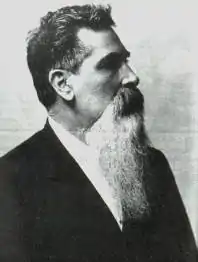
During the National Autonomist Party governments, liberal socialism emerged in Argentina's politics as opposed to the Julio Argentino Roca's ruling conservative liberalism, albeit president Domingo Faustino Sarmiento had previously implemented an agenda influenced by John Stuart Mill writings. A first spokesperson of the new trend was Leandro N. Alem, founder of the Radical Civil Union. Liberal socialists never governed in Argentina, but they constituted the main opposition from 1880 to 1914 and again from 1930 until the rise of Peronism. Adolfo Dickman, Enrique Dickmann, José Ingenieros, Juan B. Justo, Moisés Lebensohn, Alicia Moreau de Justo and Nicolás Repetto are among the representatives of the trend during the Década Infame in the 1930s as part of the Radical Civic Union or the Socialist Party.[34]
Ingenieros' work has had diffusion all over Latin America.[35] In the 2003 Argentine general election, Ricardo López Murphy (who has denominated himself a liberal socialist in the tradition of Alem and Juan Bautista Alberdi) ended third with 16.3 per cent of the popular vote.[36] Contemporary Argentine liberal socialists include Mario Bunge[37] and Juan José Sebreli.[38]
Belgium
Chantal Mouffe is a prominent Belgian advocate of liberal socialism.[39] She describes liberal socialism as follows:
To deepen and enrich the pluralist conquests of liberal democracy, the articulation between political liberalism and individualism must be broken, to make possible a new approach to individuality that restores its social nature without reducing it to a simple component of an organic whole. This is where the socialist tradition of thought might still have something to contribute to the democratic project and herein lies the promise of a liberal socialism.[39]
John Stuart Mill
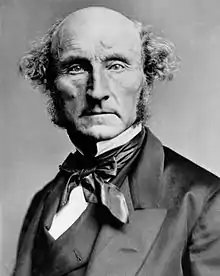
The main liberal English thinker John Stuart Mill's early economic philosophy was one of free markets. However, he accepted interventions in the economy such as a tax on alcohol, if there were sufficient utilitarian grounds. He also accepted the principle of legislative intervention for the purpose of animal welfare.[40] Mill originally believed that equality of taxation meant equality of sacrifice and that progressive taxation penalised those who worked harder and saved more and therefore was a "mild form of robbery".[41]
Given an equal tax rate regardless of income, Mill agreed that inheritance should be taxed. A utilitarian society would agree that everyone should be equal one way or another. Therefore, receiving inheritance would put one ahead of society unless taxed on the inheritance. Those who donate should consider and choose carefully where their money goes—some charities are more deserving than others. Considering public charities boards such as a government will disburse the money equally. However, a private charity board like a church would disburse the monies fairly to those who are in more need than others.[42]
Mill later altered his views toward a more socialist bent, adding chapters to his Principles of Political Economy in defence of a socialist outlook and defending some socialist causes.[43] Within this revised work, he also made the radical proposal that the whole wage system be abolished in favour of a co-operative wage system.[44] Nonetheless, some of his views on the idea of flat taxation remained,[45] albeit altered in the third edition of the Principles of Political Economy to reflect a concern for differentiating restrictions on unearned incomes which he favoured; and those on earned incomes which he did not favour.[46]
In the case of Oxford University, Mill's Principles of Political Economy, first published in 1848, was the standard text until 1919 when it was replaced by Alfred Marshall's Principles of Economics. As Adam Smith's Wealth of Nations had during an earlier period, Mill's Principles of Economy dominated economics teaching and was one of the most widely read of all books on economics in the period.[47]
In later editions of Principles of Political Economy, Mill would argue that "as far as economic theory was concerned, there is nothing in principle in economic theory that precludes an economic order based on socialist policies".[48] At some point, Mill also promoted substituting capitalist businesses with worker cooperatives,[49] writing:
The form of association, however, which if mankind continue to improve, must be expected in the end to predominate, is not that which can exist between a capitalist as chief, and work-people without a voice in the management, but the association of the labourers themselves on terms of equality, collectively owning the capital with which they carry on their operations, and working under managers elected and removable by themselves.[50]
Ethical socialism
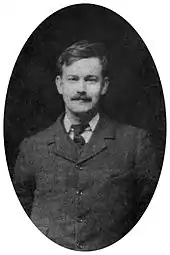
Liberal socialism has exercised influence in British politics, especially in the variant known as ethical socialism.[51] A key component of ethical socialism is in its emphasis on moral and ethical critiques of capitalism and building a case for socialism on moral or spiritual grounds as opposed to rationalist and materialist grounds. Ethical socialists advocated a mixed economy that involves an acceptance of a role of both public enterprise as well as socially responsible private enterprise.[52] Ethical socialism was founded by Christian socialist R. H. Tawney and its ideals were also connected to Fabian and guild-socialist values.[53]
It emphasises the need for a morally conscious economy based upon the principles of service, cooperation and social justice while opposing possessive individualism.[54] Ethical socialism is distinct in its focus on criticism of the ethics of capitalism and not merely criticism of material issues of capitalism. Tawney denounced the self-seeking amoral and immoral behaviour that he claimed is supported by capitalism.[55] He opposed what he called the "acquisitive society" that causes private property to be used to transfer surplus profit to "functionless owners"—capitalist rentiers.[54] However, Tawney did not denounce managers as a whole, believing that management and employees could join together in a political alliance for reform.[54] He supported the pooling of surplus profit through means of progressive taxation to redistribute these funds to provide social welfare, including public health care, public education and public housing.[56]
Tawney advocated nationalisation of strategic industries and services.[57] He also advocated worker participation in the business of management in the economy as well as consumer, employee, employer and state cooperation in the economy.[57] Though he supported a substantial role for public enterprise in the economy, Tawney stated that where private enterprise provided a service that was commensurate with its rewards that was functioning private property, then a business could be usefully and legitimately be left in private hands.[52] Ethical socialist Thomas Hill Green supported the right of equal opportunity for all individuals to be able freely appropriate property, but he claimed that acquisition of wealth did not imply that an individual could do whatever they wanted to once that wealth was in their possession. Green opposed "property rights of the few" that were preventing the ownership of property by the many.[58]
Ethical socialism is an important ideology of the Labour Party. Labour Prime Minister Clement Attlee supported the ideology, which played a large role in his party's policies during the postwar 1940s.[59] Half a century after Attlee's tenure, Tony Blair, another Labour Prime Minister, also described himself as an adherent of ethical socialism, which for him embodies the values of "social justice, the equal worth of each citizen, equality of opportunity, community".[60] Influenced by Attlee and John Macmurray (who himself was influenced by Green),[61] Blair has defined the ideology in similar terms as earlier adherents—with an emphasis on the common good, rights and responsibilities as well as support of an organic society in which individuals flourish through cooperation.[61] Blair argued that Labour ran into problems in the 1960s and 1970s when it abandoned ethical socialism and that its recovery required a return to the values promoted by the Attlee government.[6] However, Blair's critics (both inside and outside Labour) have accused him of completely abandoning socialism in favour of capitalism.[62]
Pierre-Joseph Proudhon
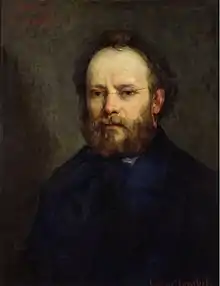
While Pierre-Joseph Proudhon was a revolutionary, his social revolution did not mean civil war or violent upheaval, but rather the transformation of society. This transformation was essentially moral in nature and demanded the highest ethics from those who sought change. It was monetary reform, combined with organizing a credit bank and workers associations, that Proudhon proposed to use as a lever to bring about the organization of society along new lines.[63] Proudhon's ethical socialism has been described as part of the liberal socialist tradition which is for egalitarianism and free markets, with Proudhon taking "a commitment to narrow down the sphere of activity of the state".[64] James Boyle quoted Proudhon as stating that socialism is "every aspiration towards the amelioration of society" and then admitting that "we are all socialists" under this definition.[65]
Proudhon was a supporter of both free markets and property, but he distinguished between the privileged private property that he opposed and the earned personal property that he supported.[66] By free markets, Proudhon meant industrial democracy and workers' self-management. Mutualism involved free association by creating industrial democracy, a system where workplaces would be "handed over to democratically organised workers' associations. [...] We want these associations to be models for agriculture, industry and trade, the pioneering core of that vast federation of companies and societies woven into the common cloth of the democratic social Republic."[67] Under mutualism, like in Mill's version of liberal socialism, workers would no longer sell their labour to a capitalist but rather work for themselves in cooperatives. Proudhon urged "workers to form themselves into democratic societies, with equal conditions for all members, on pain of a relapse into feudalism". This would result in "[c]apitalistic and proprietary exploitation, stopped everywhere, the wage system abolished, equal and just exchange guaranteed".[68]
Robert Graham noted that "Proudhon's market socialism is indissolubly linked to his notions of industrial democracy and workers' self-management".[69] In his in-depth analysis of this aspect of Proudhon's ideas, K. Steven Vincent noted that "Proudhon consistently advanced a program of industrial democracy which would return control and direction of the economy to the workers".[70] For Proudhon, "strong workers' associations [...] would enable the workers to determine jointly by election how the enterprise was to be directed and operated on a day-to-day basis".[71]
Germany
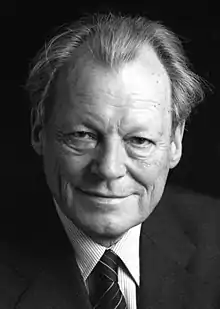
An early version of liberal socialism was developed in Germany by Franz Oppenheimer.[72] Although he was committed to socialism, Oppenheimer's theories inspired the development of the social liberalism that was pursued by German Chancellor Ludwig Erhard, who said the following: "As long as I live, I will not forget Franz Oppenheimer! I will be as happy if the social market economy—as perfect or imperfect as it might be—continues to bear witness to the work, to the intellectual stance of the ideas and teachings of Franz Oppenheimer."[72]
In the 1930s, the Social Democratic Party of Germany (SPD), a reformist socialist political party that was up to then based upon revisionist Marxism, began a transition away from orthodox Marxism towards liberal socialism. After it was banned by the Nazi regime in 1933, the SPD acted in exile through the Sopade. In 1934, the Sopade began to publish material that indicated that the SPD was turning towards liberal socialism.[73]
Curt Heyer, a prominent proponent of liberal socialism within the Sopade, declared that Sopade represented the tradition of Weimar Republic social democracy (a form of liberal democratic socialism) and declared that Sopade's held true to its mandate of traditional liberal principles combined with the political realism of socialism.[74] After the restoration of democracy in West Germany, the SPD's Godesberg Program in 1959 eliminated the party's remaining Marxist policies. The SPD then became officially based upon liberal socialism (German: freiheitlicher Sozialismus).[75] West German Chancellor Willy Brandt has been identified as a liberal socialist.[76]
Hungary
In 1919, the Hungarian politician Oszkár Jászi declared his support for what he termed "liberal socialism" while denouncing "communist socialism".[77] Opposed to classical social democracy's prevalent focus on support from the working class, Jászi saw the middle class and smallholder peasants as essential to the development of socialism and spoke of the need of a "radical middle-class".[77] His views were especially influenced by events in Hungary in 1919 involving the Bolshevik revolution during which he specifically denounced the Marxist worldview shortly after the collapse of the Hungarian Soviet Republic, calling his views "Anti-Marx". His criticism of orthodox Marxism was centered on its mechanical, value-free and amoral methodology.[78] He argued that "[i]n no small measure, the present terrible, bewildering world crisis is a consequence of Marxism's mechanical Communism and amoral nihilism. New formulas of spirit, freedom and solidarity have to be found".[78]
Jászi promoted a form of co-operative socialism that included liberal principles of freedom, voluntarism and decentralization.[77] He counterpoised this ideal version of socialism with the then-existing political system in the Soviet Union, which he identified as based upon dictatorial and militarist perils, statism and a crippled economic order where competition and quality are disregarded.[79]
Jászi's views on socialism and especially his works justifying the denouncement of Bolshevik communism came back into Hungarian public interest in the 1980s when copies of his manuscripts were discovered and were smuggled into Hungary that was then under communist party-rule.[79]
Italy
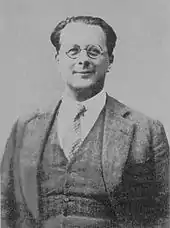
Going back to Italian revolutionaries and socialists such as Giuseppe Garibaldi and Giuseppe Mazzini,[80] Italian socialist Carlo Rosselli was inspired by the definition of socialism by the founder of social democracy, Eduard Bernstein, who defined socialism as "organised liberalism". Rosselli expanded on Bernstein's arguments by developing his notion of liberal socialism (Italian: socialismo liberale).[81] In 1925, Rosselli defined the ideology in his work of the same name in which he supported the type of socialist economy defined by socialist economist Werner Sombart in Der modern Kapitalismus (1908) that envisaged a new modern mixed economy that included both public and private property, limited economic competition and increased economic cooperation.[82]
While appreciating principles of liberalism as an ideology that emphasised liberation, Rosselli was deeply disappointed with liberalism as a system that he described as having been used by the bourgeoisie to support their privileges while neglecting the liberation components of liberalism as an ideology and thus viewed conventional liberalism as a system that had merely become an ideology of "bourgeois capitalism".[83] At the same time, Rosselli appreciated socialism as an ideology, but he was also deeply disappointed with conventional socialism as a system.[84]
In response to his disappointment with conventional socialism in practice, Roselli declared: "The recent experiences, all the experiences of the past thirty years, have hopelessly condemned the primitive programs of the socialists. State socialism especially—collectivist, centralising socialism—has been defeated".[84] Rosselli's liberal socialism was partly based upon his study and admiration of British political themes of the Fabian Society and John Stuart Mill (he was able to read the English versions of Mill's work On Liberty prior to its availability in Italian that began in 1925). His admiration of British socialism increased after his visit to the United Kingdom in 1923 where he met George Drumgoole Coleman, R. H. Tawney and other members of the Fabian Society.[85]
An important component of Italian liberal socialism developed by Rosselli was its anti-fascism.[86] Rosselli opposed fascism and believed that fascism would only be defeated by a revival of socialism.[86] Rosselli founded Giustizia e Libertà as a resistance movement founded in the 1930s in opposition to the Fascist regime in Italy.[87] Ferruccio Parri—who later became Prime Minister of Italy—and Sandro Pertini—who later became President of Italy—were among Giustizia e Libertà's leaders.[83] Giustizia e Libertà was committed to militant action to fight the Fascist regime and it saw Benito Mussolini as a ruthless murderer who himself deserved to be killed as punishment.[88] Various early schemes were designed by the movement in the 1930s to assassinate Mussolini, including one dramatic plan of using an aircraft to drop a bomb on Piazza Venezia where Mussolini resided.[86] Rosselli was also a prominent member of the liberal-socialist Action Party.[89]
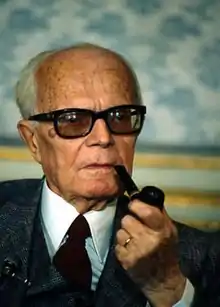
After Rosselli's death, liberal socialism was developed in Italian political thought by Guido Calogero.[23] Unlike Rosselli, Calogero considered the ideology as a unique ideology called liberalsocialism (Italian: liberalsocialismo) that was separate from existing liberal and socialist ideologies.[23] Calogero created the "First Manifesto of Liberalsocialism" in 1940[90] that stated the following:
At the basis of liberalsocialism stands the concept of the substantial unity and identity of ideal reason, which supports and justifies socialism in its demand for justice as much as it does liberalism in its demand for liberty. This ideal reason coincides with that same ethical principle to whose rule humanity and civilization, both past and future, must always measure up. This is the principle by which we recognize the personhood of others in contrast to our own person and assign to each of them a right to own their own.[90]
After World War II, Ferruccio Parri of the liberal socialist Action Party briefly served as Prime Minister of Italy in 1945.[91] In 1978, liberal socialist Sandro Pertini of the Italian Socialist Party was elected President of Italy in 1978 and served as President until 1985.[92]
See also
References
Footnotes
- Gaus & Kukathas 2004, p. 420.
- Adams 1999, p. 127.
- Pugliese 1999, p. 99; Thompson 2006, pp. 60–61.
- Docherty & Lamb 2006, pp. 1–2.
- Bartlett 1970, p. 32.
- Bastow & Martin 2003, p. 72.
- Pierson 1995, p. 71.
- Hunt 2015, p. 112–113.
- Rosselli 1994, p. 51.
- Baum 2007, p. 101.
- Dale 2016, pp. 49–53.
- Fried 2004, p. 66.
- Dale 2016, pp. 49–53; Doležalová 2018, pp. 95–96.
- Tyler 2012, pp. 259–280.
- Doležalová 2018, pp. 95–96.
- Kates 1989.
- Dale 2016, p. 61.
- Canto-Sperber 2004; Dale 2016, pp. 49–53.
- Brown 2007, p. 237; Dale 2016, pp. 49–53.
- Rosselli 1994, p. 51; Weinstein 1998; Offer 2000, p. 137; Dale 2016, pp. 49–53; Bobbio 2015, p. 6.
- Cirillo 1980, p. 295; Fried 2004, p. 66; Potier 2011, p. 114; De Buen 2019; Mueller 2020.
- Davidson 1995; Baum 2007, p. 101.
- Bresser-Pereira 2004, p. 84.
- White 1999, p. 166.
- Bresser-Pereira 2004, p. 104.
- Litván 2006, p. 125; Dale 2016, pp. 49–53.
- Dardot & Laval 2014, p. 39.
- Rep 2000, p. 238; Dale 2016, pp. 49–53; Doležalová 2018, p. 95.
- Davidson 1995; Kerr 2017.
- Dale 2016.
- Miller 2003, pp. 213–238.
- Brilhante & Rocha 2010, pp. 17–27.
- Boyd & Harrison 2003, pp. 220–222; Anton & Schmitt 2012, pp. 3–4.
- Rodríguez Braun 2019.
- Morales Brito 2014, pp. 115–118.
- Rey 2003.
- Bunge 2016, pp. 345–347; Katy 2019, pp. 513–534.
- Rey 2003; García 2018.
- Coperías-Aguilar 2000, p. 39.
- Linzey 2002; Morris 2002.
- Pellerin 2009.
- Strasser 1991.
- Bentham & Mill 2004, p. 11.
- Wilson 2007; Hill 2020, p. 52.
- Wilson 2007.
- Mill 1852. The passage about flat taxation was altered by the author in this edition which is acknowledged in this edition's footnote 8: "This sentence replaced in the 3rd ed. a sentence of the original: "It is partial taxation, which is a mild form of robbery."
- Ekelund Jr. & Hébert 1997, p. 172.
- Wilson 2007; Baum 2007.
- Schwartz 2012, p. 219.
- Mill 1848.
- Dearlove & Saunders 2000, p. 427; Thompson 2006, p. 52.
- Thompson 2006, pp. 60–61.
- Thompson 2006, pp. 52, 58, 60.
- Thompson 2006, p. 58.
- Thompson 2006, p. 52.
- Thompson 2006, pp. 58–59.
- Thompson 2006, p. 59.
- Carter 2003, p. 35.
- Howell 2006, pp. 130–132.
- Jackson & Tansey 2008, p. 97.
- Carter 2003, pp. 189–190.
- Elliott, Faucher-King & Le Galès 2010, p. 18.
- Canto-Sperber 2004.
- Dale 2016, p. 49.
- Boyle 1912, p. 35; Gray 1963, p. 490.
- Crowder 1991, pp. 85–86; Proudhon 2011, p. 91; Hargreaves 2019, pp. 90–91.
- Guérin 2006, p. 62.
- Proudhon 1989, pp. 277–281.
- Proudhon 1989, p. xxxii.
- Steven 1984, p. 156.
- Steven 1984, p. 230.
- Repp 2000, p. 238.
- Edinger 1956, p. 215.
- Edinger 1956, pp. 219–220.
- Orlow 2000, p. 108.
- Bronner 1999, p. 104.
- Litván 2006, p. 125.
- Litván 2006, p. 199.
- Litván 2006, p. 200.
- Rosselli 1994.
- Rosselli 1994; Steger 2006, p. 146.
- Pugliese 1999, p. 99.
- Pugliese 1999, p. 51.
- Pugliese 1999, p. 53.
- Pugliese 1999, pp. 59–60.
- Dombroski 2001, p. 122.
- Wilkinson 1981, p. 224.
- Di Scala 1996, p. 87.
- Bastow & Martin 2003, p. 74.
- Bastow & Martin 2003, p. 84.
- Pugliese 1999, pp. 59–60, 236.
- Pugliese 1999, p. 236.
Notes
- 5. Bartlett 1970, p. 32: "Liberal socialism, for example, is unequivocally in favour of the free market economy and of freedom of action for the individual and recognises in legalistic and artificial monopolies the real evils of capitalism."
- 7. Pierson 1995, p. 71: "If the contrast which 1989 highlights is not that between socialism in the East and liberal democracy in the West, the latter must be recognized to have been shaped, reformed and compromised by a century of social democratic pressure. Whatever the recent ascendancy in some quarters of neo-liberal parties and/or policies, social democratic forces remain deeply entrenched in the social fabric. In practice, social democratic and socialist parties within the constitutional arena in the West have almost always been involved in a politics of compromise with existing capitalist institutions (to whatever far distant prize its eyes might from time to time have been lifted). These have always been grounds for condemnation by those 'further to the left'. Yet, if advocates of the death of socialism accept that social democrats belong within the socialist camp, as I think they must, then the contrast between socialism (in all its variants) and liberal democracy must collapse. For actually existing liberal democracy is, in substantial part, a product of socialist (social democratic) forces."
- 19. Weinstein 1998, p. 205: "[C]ooperation is, of course, arguably a form of socialism as much as form of liberalism."
- 19. Offer 2000, p. 137: "Several labels might be tied to this family member; the practitioners favoured 'moral or liberal socialism,' at times 'socialism of the will.'"
- 19. Bobbio 2015, p. 6: "One handbook of socialist propaganda advised readers to 'first read any summary of Darwin and Spencer that gives the student the general direction of modern thought, then turn to Marx to complete the formidable triad that worthily makes up the gospel of contemporary Socialists.'"
- 19. De Buen 2019: "Interestingly, Walras was a self-described socialist (albeit with some qualifications). His brand of socialism is closer to what is now commonly referred to as Georgism, due to American economist Henry George (though Walras first published on the subject in 1861, a few years before George). Walras advocated for a free market economy in which capital, production, and exchange remain in the hands of private actors. However, he also proposed the full socialization of the product of land. This included, not only taxation on land value but even the repurchase of all land by the state so that it could be publicly owned and land rents could become socialized wealth."
- 47. Baum 2007, pp. 99–100: "Mill, in contrast, advances a form of liberal democratic socialism for the enlargement of freedom as well as to realize social and distributive justice. He offers a powerful account of economic injustice and justice that is centered on his understanding of freedom and its conditions."
Bibliography
- Adams, Ian (1999). "Social Democracy to New Labour". Ideology and Politics in Britain Today. Manchester, England: Manchester University Press. pp. 127–153. ISBN 9780719050565.
- Anton, Anatole; Schmitt, Richard (2012). Taking Socialism Seriously. Lanham, Maryland: Lexington Books. ISBN 9780739166352.
- Bartlett, Roland Willey (1970). The Success of Modern Private Enterprise. Danville, Illinois: Interstate Printers & Publishers. ISBN 9780813411484.
- Bastow, Steve; Martin, James (2003). Third Way Discourse: European Ideologies in the Twentieth Century. Edinburgh, Scotland: Edinburgh University Press. ISBN 9780748615605.
- Baum, Bruce (2007). "J. S. Mill and Liberal Socialism". In Urbanati, Nadia; Zachars, Alex (eds.). J. S. Mill's Political Thought: A Bicentennial Reassessment. Cambridge, England: Cambridge University Press. pp. 98–101. ISBN 9781139462518.
- Bentham, Jeremy; Mill, John Stuart (2004). Ryan, Alan (ed.). Utilitarianism and other essays. London, England: Penguin Books. ISBN 9780140432725.
- Bobbio, Norberto (2014). Ideological Profile of Twentieth-Century Italy. Translated by Cochrane, Lydia G. Princeton, New Jersey: Princeton University Press. ISBN 9781400864171.
- Boyd, Tony; Harrison, Kevin, eds. (2003). Understanding Political Ideas and Movements. Manchester, England: Manchester University Press. ISBN 9780719061516.
- Boyle, James (1912). What Is Socialism?. London, England: Shakespeare Press.
- Bresser-Pereira, Luiz Carlos (2004). Democracy and Public Management Reform: Building the Republican State. Oxford, England: Oxford University Press. ISBN 9780199261185.
- Brilhante, Átila Amaral; Rocha, Francisco José Sales (June 2010). "John Stuart Mill on Socialism and Accountability". Florianópolis. 9 (1). doi:10.5007/1677-2954.2010v9n1p17.
- Bronner, Stephen Eric (1999). Ideas in Action: Political Tradition in the Twentieth Century. Lanham, Maryland: Rowman & Littlefield Publishers. ISBN 9780847693863.
- Brown, Vivienne (2007). The Adam Smith Review. 3. London, England; New York City, New York: Routledge. ISBN 9781134060108. ISSN 1743-5285.
- Bunge, Mario (2016). Between Two Worlds: Memoirs of a Philosopher-Scientist. Springer Biographies. Berlin; New York: Springer-Verlag. doi:10.1007/978-3-319-29251-9. ISBN 9783319292502. OCLC 950889848.
- Canto-Sperber, Monique (2004). "Proudhon, the First Liberal Socialist" (PDF). In Parrine, Mary Jane (ed.). A Vast and Useful Art: The Gustave Gimon Collection on French Political Economy. Translated by Andrews, Naomi J. Redwood City: Stanford University. pp. 1–16. ISBN 9780911221305.
- Carter, Matt (2003). T. H. Green and the Development of Ethical Socialism. British Idealist Studies, Series 3: Green. Exeter, England; Charlottesville, Virginia: Imprint Academic. ISBN 9780907845324.
- Cirillo, Renato (July 1980). "The 'Socialism' of Léon Walras and His Economic Thinking". The American Journal of Economics and Sociology. 39 (3): 295–303. doi:10.1111/j.1536-7150.1980.tb01281.x. JSTOR 3486110.
- Coperías-Aguilar, María José (2000). Culture and Power: Challenging Discourses (English ed.). Valencia, Spain: Valencia University Press. ISBN 9788437044293.
- Crowder, George (1991). Classical Anarchism: The Political Thought of Godwin, Proudhon, Bakunin, and Kropotkin. Oxford, England: Clarendon Press. ISBN 9780198277446.
- Dale, Gareth (2016). "Bearing the Cross of War". Karl Polanyi: A Life on the Left. New York City, New York: Columbia University Press. pp. 41–71. ISBN 9780231541480.
- Dardot, Pierre; Laval, Christian (2014). The New Way of the World: On Neoliberal Society. Translated by Elliott, Gregory. New York City, New York: Verso Books. ISBN 9781781681763.
- Davidson, Alastair (1995). "Dilemma of Liberal Socialism: The Case of Norberto Bobbio". Australian Journal of Politics and History. 41 (1): 47–54. doi:10.1111/j.1467-8497.1995.tb01335.x.
- Dearlove, John; Saunders, Peter (2000). Introduction to British Politics (revised and updated 3rd ed.). Hoboken, New Jersey: Wiley-Blackwell. ISBN 9780745620954.
- De Buen, Néstor (13 August 2019). "Where Hayek and Marx Part Ways". Merion West. Retrieved 2 April 2020.
- Di Scala, Spencer Di Scala (1996). Italian Socialism: Between Politics and History. Boston, Massachusetts: University of Massachusetts Press. ISBN 9781558490123.
- Docherty, James C.; Lamb, Peter, eds. (2006). "Social democracy". Historical Dictionary of Socialism. Historical Dictionaries of Religions, Philosophies, and Movements. 73 (2nd ed.). Lanham, Maryland: Scarecrow Press. ISBN 9780810855601.
- Doležalová, Antonie (2018). A History of Czech Economic Thought. New York City, New York: Routledge. ISBN 9781317428657.
- Dombroski, Robert S. (2001). "Socialism, Communism, and other 'isms'". In West, Rebecca; Barański, Zygmunt G. (eds.). The Cambridge Companion to Modern Italian Culture. Cambridge, England: Cambridge University Press. ISBN 9780521559829.
- Edinger, Lewis Joachim (1956). German Exile Politics: The Social Democratic Executive Committee in the Nazi Era. Berkeley and Los Angeles, California: University of California Press. ASIN B000X76USQ.
- Ekelund Jr., Robert B.; Hébert, Robert F. (1997). A History of Economic Theory and Method (4th ed.). Long Grove, Illinois: Waveland Press. ISBN 9781577663812.
- Elliott, Gregory; Faucher-King, Florence; Le Galès, Patrick (2010). The New Labour Experiment: Change and Reform Under Blair and Brown. Palo Alto, California: Stanford University Press. ISBN 9780804762342.
- Fried, Barbara (2004). "Left-Libertarianism: A Review Essay". Philosophy & Public Affairs. Blackwell Publishing. 32 (1): 66–92. doi:10.1111/j.1467-6486.2004.00005.x. JSTOR 3557982.
- Gaus, Gerald F.; Kukathas, Chandran (2004). Handbook of Political Theory. London, England: SAGE Publications. ISBN 9780761967873.
- White, Stuart (1999). "'Rights and Responsabilities': A Social Democratic Perspective". In Gamble, Andrew; Wright, Tony (eds.). The New Social Democracy. Oxford, England: Taylor & Francis. ISBN 9780631217657.
- García, Fernando (18 January 2018). "Juan José Sebreli: 'Si se pierde esta oportunidad, vuelve seguro el populismo más acérrimo'". La Nación (in Spanish). Retrieved 14 June 2020.
- Gray, Alexander (1963). The Socialist Tradition: Moses to Lenin. Auburn, Alabama: Mises Institute. ISBN 9781610163385.
- Guérin, Daniel, ed. (2006). No Gods, No Masters. 1. Oakland, California: AK Press. ISBN 9781904859253.
- Hargreaves, David H. (2019). Beyond Schooling: An Anarchist Challenge. London, England: Routledge. ISBN 9780429582363.
- Hill, John Lawrence (2020). The Prophet of Modern Constitutional Liberalism: John Stuart Mill and the Supreme Court. Cambridge, England: Cambridge University Press. ISBN 9781108485296.
- Howell, David (2006). Attlee (illustrated ed.). London, England: Haus Publishing. ISBN 9781904950646.
- Hunt, Ian (2015). Liberal Socialism: An Alternative Social Ideal Grounded in Rawls and Marx. Lanham Maryland: Lexington Books. ISBN 9781498506540.
- Jackson, Nigel A.; Tansey, Stephen D. (2008). Politics: The Basics (illustrated 4th ed.). London, England; New York City, New York: Routledge. ISBN 9780415422437.
- Kates, Gary (1989). "From Liberalism to Radicalism: Tom Paine's Rights of Man". Journal of the History of Ideas. University of Pennsylvania Press. 50 (4): 569–587. doi:10.2307/2709798. JSTOR 2709798.
- Kary, Michael (2019). "Ethical Politics and Political Ethics II: On Socialism Through Integral Democracy". In Matthews, Michael R. (ed.). Mario Bunge: A Centenary Festschrift. Cham, Germany: Springer-Verlag. doi:10.1007/978-3-030-16673-1_29. ISBN 9783030166724. OCLC 1109956992.
- Kerr, Gavin (2017). "Liberal Socialism and the Right to Private Property". The Property-Owning Democracy: Freedom and Capitalism in the Twenty-First Century. New York City, New York: Taylor & Francis. pp. 170–204. ISBN 9781351996358.
- Linzey, Andrew (2002). "The Morality of Hunting with Dogs" (PDF). International Fund for Animal Welfare. Archived from the original (PDF) on 26 June 2008. Retrieved 2 April 2020.
- Litván, György (2006). A Twentieth-Century Prophet: Oszkár Jászi, 1875–1957 (English ed.). Budapest, Hungary: Central European Press. ISBN 9799637326423.
- Mill, John Stuart (1848). "IV.7.21.". Principles of Political Economy (1st ed.). Farnham, Surrey: John W. Parker.
- Mill, John Stuart (1852). "On The General Principles of Taxation, V.2.14". Principles of Political Economy (3rd ed.). Farnham, Surrey: John W. Parker.
- Miller, Dale E. (2003). "Mill's 'Socialism". Politics, Philosophy & Economics. 2 (2): 213–238. doi:10.1177/1470594x03002002004.
- Morales Brito, Jorge (2014). Filosofía y política en el pensamiento de José Ingenieros (PDF) (in Spanish). Santa Clara: University "Marta Abreu" of Las Villas.
- Morris, Steven (11 September 2002). "Hunting debate gets teeth into Plato, Aristotle, Harry and Pepper". The Guardian. Retrieved 2 April 2020.
- Mueller, Thomas Michael (17 March 2020). "Against the orthodox: Walras and Laveleye's reluctant alliance". The European Journal of the History of Economic Thought. 27 (1): 1–23. doi:10.1080/09672567.2020.1739103.
- Offer, John, ed. (2000). Herbert Spencer: Critical Assessments. 2. London, England; New York City, New York: Taylor & Francis. ISBN 9780415181853.
- Orlow, Dietrich (2000). Common Destiny: A Comparative History of the Dutch, French, and German Social Democratic Parties, 1945–1969 (illustrated, reprinted ed.). New York City, New York; Oxford, England: Berghahn Books. ISBN 9781571812254.
- Pellerin, Daniel (28 November 2009). "Taxation and Justice" (PDF). Institut de Recherches Économiques et Fiscales. Archived from the original on 27 March 2009. Retrieved 2 April 2020.
- Pierson, Christoper (1995). Socialism After Communism: The New Market Socialism. University Park, Pennsylvania: Penn State Press. ISBN 9780271014791.
- Potier, Jean-Pierre (March 2011). "The Socialism of Léon Walras". L'Économie Politique. Alternatives Economiques (51): 33–49.
- Proudhon, Pierre-Joseph (1989) [1851]. Graham, Robert (ed.). The General Idea of the Revolution. Translated by Robinson, John Beverley. London, England: Pluto Press. ISBN 9781853050671.
- Proudhon, Pierre-Joseph (2011) [1840]. McKay, Iain (ed.). Property is Theft!: A Pierre-Joseph Proudhon Anthology? (illustrated revised ed.). Oakland: AK Press. ISBN 9781849350242.
- Pugliese, Stanislao G. (1999). Carlo Rosselli: Socialist Heretic and Antifascist Exile (illustrated ed.). Cambridge, Massachusetts: Harvard University Press. ISBN 9780674000537.
- Repp, Kevin (2000). Reformers, Critics, and the Paths of German Modernity: Anti-Politics and the Search for Alternatives, 1890–1914 (illustrated ed.). Cambridge, Massachusetts: Harvard University Press. ISBN 9780674000575.
- Rey, Pedro B. (4 May 2003). "Juan José Sebreli: 'En las elecciones ganó el que vuelvan todos'". La Nación (in Spanish). Retrieved 14 June 2020.
- Rodríguez Braun, Carlos (1 August 2019). "Juan B. Justo y el socialismo liberal". Club Libertad Digital (in Spanish). Retrieved 27 May 2020.
- Rosselli, Carlo (1994). Urbinati, Nadia (ed.). Liberal Socialism. Translated by McCuaig, William. Princeton, New Jersey: Princeton University Press. ISBN 9780691025605.
- Schwartz, Justin (2012). "Where Did Mill Go Wrong? Why the Capital-Managed Rather than the Labor-Managed Enterprise is the Predominant Organizational Form in Market Economies" (PDF). Ohio State Law Journal. 73 (2). Retrieved 3 April 2020.
- Steger, Manfred B. (2006). The Quest for Evolutionary Socialism (reprinted ed.). Cambridge, England: Cambridge University Press. ISBN 9780521025058.
- Thompson, Noel W. (2006). Political Economy and the Labour Party: The Economics of Democratic Socialism, 1884–2005 (2nd ed.). Oxon, England; New York City, New York: Routledge. ISBN 9781134332953.
- Tyler, Colin (2012). "D. G. Ritchie on Socialism, History and Locke". Journal of Political Ideologies. 17 (3): 259–280. doi:10.1080/13569317.2012.716615.
- Vincent, K. Steven (1984). Pierre-Joseph Proudhon and the Rise of French Republican Socialism. Oxford, England: Oxford University Press. ISBN 9780195034134.
- Weinstein, David (1998). "Land Nationalization and Property". Equal Freedom and Utility: Herbert Spencer's Liberal Utilitarianism. Cambridge, England: Cambridge University Press. pp. 181–209. ISBN 9780521622646.
- Wilkinson, James D. (1981). The Intellectual Resistance Movement in Europe (illustrated, reprinted, revised ed.). Cambridge, Massachusetts: Harvard University Press. ISBN 9780674457768.
- Wilson, Fred (10 July 2007). "Political Economy". John Stuart Mill. Stanford Encyclopedia of Philosophy. Stanford University. Retrieved 2 April 2020.
Further reading
- Bozoki, Andras; Sukosd, Miklos (1991). Liberty and Socialism: Writings of Libertarian Socialists in Hungary, 1884–1919. Savage, Maryland: Rowman & Littlefield. ISBN 9780847676804.
- Bronner, Stephen Eric (2004). Reclaiming the Enlightenment: Toward a Politics of Radical Engagement. New York City, New York: Columbia University Press. ISBN 9780231500982.
- Dallmayr, Fred; Zhao, Tingyang (2012). Contemporary Chinese Political Thought: Debates and Perspectives. Lexington, Kentucky: University Press of Kentucky. ISBN 9780813140636.
- Howe, Irwing (2013). "Socialism and Liberalism: Articles of Conciliation?". In Jumonville, Neil (ed.). The New York Intellectuals Reader. London, England; New York City, New York: Routledge. ISBN 9781135927523.
- Wallerstein, Immanuel (2011). "Centrist Liberalism As Ideology". The Modern World-System IV: Centrist Liberalism Triumphant, 1789–1914. Berkeley and Los Angeles, California: University of California Press. pp. 1–20. ISBN 9780520948600.